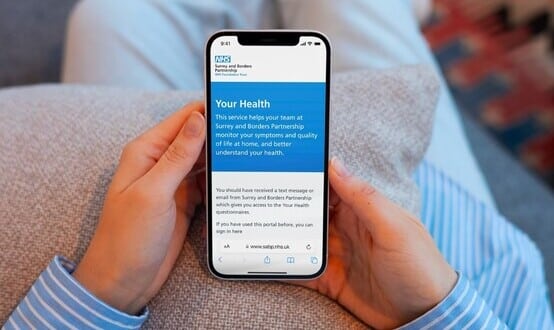Digitally enabled care to go ‘mainstream’ in the next decade, Long Term Plan promises
- 7 January 2019

NHS England has pledged that digitally-enabled care will go ‘mainstream’ across the NHS over the next decade, and set eight milestones on the way to that goal.
The NHS Long Term Plan, published today, includes a chapter solely on digital technology which details aims for the coming years.
It states that, in 10 years’ time, the “NHS [in England] will offer a ‘digital first’ option for most, allowing for longer and richer face-to-face consultations with clinicians where patients want or need it”.
For primary care, the milestone states that by 2023/24, every patient in England will be able to access a digital first primary care offer.
According to NHS England, this commitment will be delivered via the creation of a new framework for suppliers, and by the adjustment of the GP payment formulae for digital first practices.
This adjustment will ‘ensure fair funding without inequality favouring one type of GP provider over another’, the plan says – an argument which has arisen following the launch of Babylon’s GP at Hand app in 2017.
The 126-page document also says all patients to have access to their care plan and to communications from their care professionals via the NHS App by 2021/22.
The NHS App, according to NHS England, will ‘create a standard online way’ for people to access the health service and will work ‘seamlessly with other services at national and local levels’.
The importance of CIOs and CCIOs is also highlighted, with one milestone saying there will be one or the other on the board of every local NHS organisation by 2021/22.
Digital Health News, previously as EHI, has campaigned for the appointment of CCIOs in every trust since 2002.
The plan – which has been on the cards since last June, when Teresa May announced more funding for the English NHS but said it would need to develop detailed proposals on how it would be spent – was launched at Alder Hey Children’s Hospital in Liverpool.
The prime minister, who was joined by NHS England chief executive Simon Stevens, said it was an ‘historic moment’ for the NHS.
Theresa May added: “I wanted to see the NHS make greater use of technology, not only to make healthcare safer and more effective, but making the most of exciting new possibilities and giving you greater control over your own care.”
NHS Digital’s chief executive, Sarah Wilkinson, has also welcomed the plan.
She said: “We are particularly pleased that the plan recognises the extent to which new and improved technology and digital services can enable many of the goals set-out, all of which we whole-heartedly support.
“Over the coming years we in NHS Digital, working closely with our partners across the system, will work to make digital access to health and care services as pervasive as it is now across other sectors.”
[themify_box icon=”info” color=”gray”]
The NHS’s milestones for digital technology, as set out in the NHS Long Term Plan:
- During 2019 we will introduce controls to ensure new systems purchased by the NHS comply with agreed standards, including those set out in The Future of Healthcare [the preliminary policy paper published last October, which set out Matt Hancock’s digital vision for the NHS].
- By 2020, five geographies will deliver a longitudinal health and care record platform linking NHS and local authority organisations, three additional areas will follow in 2021.
- In 2020/21, people will have access to their care plan and communications from their care professionals via the NHS App; the care plan will move to the individual’s LHCR [Local Health Care Record] across the country over the next five years.
- By summer 2021, we will have 100% compliance with mandated cyber security standards across all NHS organisations in the health and care system.
- In 2021/22, we will have systems that support population health management in every Integrated Care System across England, with a Chief Clinical Information Officer or Chief Information Officer on the board of every local NHS organisation.
- By 2022/23, the Child Protection Information system will be extended to cover all healthcare settings, including general practices.
- By 2023/24 every patient in England will be able to access a digital first primary care offer.
- By 2024, secondary care providers in England, including acute, community and mental health care settings, will be fully digitised, including clinical and operational processes across all settings, locations and departments. Data will be captured, stored and transmitted electronically, supported by robust IT infrastructure and cyber security, and LHCRs [Local Health Care Records] will cover the whole country.
[/themify_box]





2 Comments
Ambitious – especially as – AFAIAA – current hospital systems are not structured to support clinical Coding (SNOMED-CT) in consultation.
Will hospital/MH/social care electronic patient records be able to support the ambitions of the NHS Long Term Plan – and if they could, would they be usable by the current or future workforce?
Lorenzo has taken over 10 years to develop: other systems are much older & predate SNOMED as a standard.
Come to that, are the record keeping needs of different specialities compatible with each other – let alone interoperable with the GP model(s)?
Is there any benefit in everyone carrying a digital record of a basic health record, to assist if there were an urgent need for medical attention ? It could also keep a record of specific patient information.
This could later dovetail into the local or national Health Care Record…
Comments are closed.